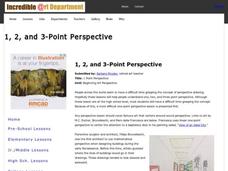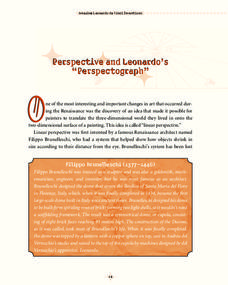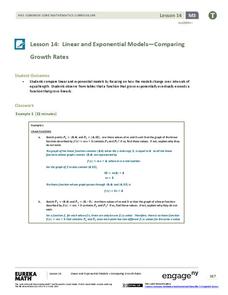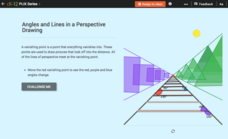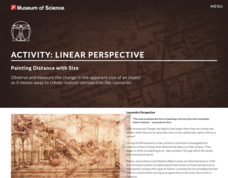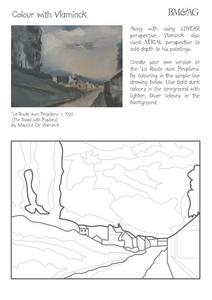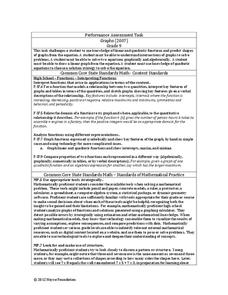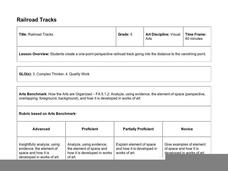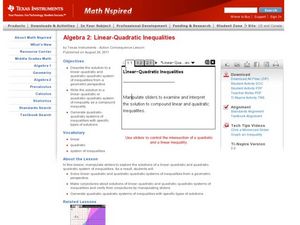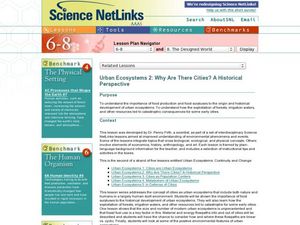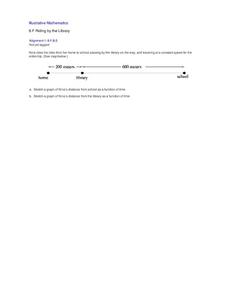National Gallery of Canada
Mastering One-Point Perspective
Cover one-point perspective through observation and practice. Class members examine several works of art that use one-point perspective, look at magazine images to find the vanishing points and horizon lines, and draw their own city...
Incredible Art
1, 2, and 3-Point Perspective
Introduce drawing high schoolers to perspective with a series of instructional activity that detail how to draft images in one-, two-, and three-point perspective. Each exercise includes step-by-step, illustrated directions and examples.
The New York Times
Perspective and Leonardo’s “Perspectograph”
Filippo Brunelleschi's invention of linear perspective during the Renaissance was further developed by his apprentice, a young artist named Leonardo da Vinci. Now modern artists can give da Vinci's famous perspectograph a try with a...
EngageNY
Linear and Exponential Models—Comparing Growth Rates
Does a linear or exponential model fit the data better? Guide your class through an exploration to answer this question. Pupils create an exponential and linear model for a data set and draw conclusions, based on predictions and the...
Curated OER
Art Basics Scavenger Hunt
Hand out this worksheet and lead your class on a scavenger hunt. Pupils look for examples of shape, form, balance, pattern, perspective, space, and depth. They draw and write about the examples they've found. A great resource to add to...
CK-12 Foundation
Families of Lines: Room in Perspective
Get a perspective of lines that share a point. The interactive displays a family of lines that share the same y-intercept. Individuals can find the equations of the lines by moving the line displayed and find what is common about all the...
CK-12 Foundation
Linear Pairs: Angles and Lines in a Perspective Drawing
Gain some perspective on linear pairs. Aspiring mathematicians adjust the vanishing point on a perspective drawing. They see the effect on linear pairs of angles and answer five challenge questions based on their observations.
Museum of Science
Linear Perspective: Painting Distance with Size
Young scholars examine a simple set up to measure the change in the apparent size of an object as it moves away from them.
Memorial Art Gallery
Learning to Look, Looking to Learn - Peeling Onions
Lilly Martin Spencer's "Peeling Onions" is the subject of a series of exercises that model for learners how to use the elements of art to read a painting. A series of worksheets focus viewers' attention on how Spencer uses color and...
Curated OER
Colour with Vlaminck
In this perspective activity, students view a painting by De Vlaminck. They create their own version of the painting by coloring an included line drawing. Students are challenged to use dark colors in the foreground and lighter, bluer...
Curated OER
City Streets in One-Point Perspective
Students examine the basics of drawing forms in one-point perspective, and linear perspective. They transform their drawings into city scenes using one-point perspective.
Inside Mathematics
Graphs (2007)
Challenge the class to utilize their knowledge of linear and quadratic functions to determine the intersection of the parent quadratic graph and linear proportional graphs. Using the pattern for the solutions, individuals develop a...
West Contra Costa Unified School District
Solving Inequalities
What does translating points on a number line have to do with solving inequalities? Young mathematicians first learn about translations of points on a number line, and then use this information to solve linear inequalities in one variable.
Curated OER
Iterating Linear Functions
Students use a spreadsheet to investigate data. For this algebra lesson, students collect and graph data on a coordinate plane. They explain properties of a linear equation both algebraically and orally.
Hawaiʻi State Department of Education
Railroad Tracks
Ahhh the vanishing point! Sounds ominous, but it's not. Fifth graders analyze the use of perspective in Renaissance art. They practice using linear perspective to draw railroad tracks that seem to go on forever. Tip: Make this...
Georgia Aquarium
The Ocean's Nursery
Linear perspective, estuaries, and water ways converge in a science-inspired art project. The class uses what they've learned about eco-systems, estuaries, and the food chain to create scale models of a local marsh. While the lesson is...
Curated OER
Linear-Quadratic Inequalities
Young scholars graph linear and quadratic functions. In this algebra lesson plan, students create graph with specific coordinate points. They use the Ti to visualise and differentiate between the two functions.
Mathematics Common Core Toolbox
Golf Balls in Water
Here's a resource that models rising water levels with a linear function. The task contains three parts about the level of water in a cylinder in relationship to the number of golf balls placed in it. Class members analyze the data and...
Museum of Science
Open Window: Using Leonardo's Perspectograph
Young scholars look through one eye and trace the outlines of objects seen through a window to create a drawing with natural and correct perspective.
Curated OER
Urban Ecosystems 2: Why Are There Cities? A Historical Perspective
Middle schoolers investigate the importance of food surpluses to the historical development of urban ecosystems.
Curated OER
Using Math to Draw the Mayflower
Third graders access information from a website about the Pilgrims trip on the Mayflower and discuss the number of people on the ship and the time they spent on the ship. They draw, label and measure the Mayflower to perspective.
Curated OER
Fantasy Buildings in Two-point Perspective
Fifth graders learn the basics of drawing forms in two-point perspective. They can then transform their drawings into a fantasy building.
Curated OER
Urban Ecosystems 4: Metabolism of Urban Ecosystems
Cities are compared to living, breathing, metabolizing organisms. Fourth in a five-part series of lessons, this one focuses on the flow of materials through a city. Links to interesting websites and images make your delivery of...
Illustrative Mathematics
Riding by the Library
Draw a graph that shows the qualitative features of a function that has been described verbally. Make sure learners understand where time is zero and the distance is zero. It may take them some time to understand this concept, so working...
Other popular searches
- Linear Perspective Drawing
- Linear Perspective Math
- One Point Linear Perspective
- Linear Perspective Geometry
- Linear Perspective Names
- Linear Perspective Interior
- Linear Perspective +Geometry
- Linear Perspective + Math
- Linear Perspective %2Geometry



